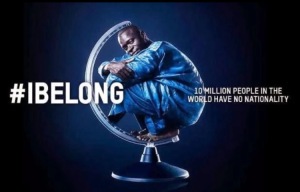I Belong: The Plight of the Stateless
The thought of being stateless is a foreign concept to most of us. The grim reality is that the many conflicts abroad, including Syria, Iraq, Iran, the Congo, Nigeria, Libya and beyond have rendered countless individuals stateless. The numbers from Syria alone are staggering:
“An estimated 9 million Syrians have fled their homes since the outbreak of civil war in March 2011, taking refuge in neighbouring countries or within Syria itself. According to the United Nations High Commissioner for Refugees (UNHCR), over 3 million have fled to Syria’s immediate neighbours Turkey, Lebanon, Jordan and Iraq. 6.5 million are internally displaced within Syria. Meanwhile, under 150,000 Syrians have declared asylum in the European Union, while member states have pledged to resettle a further 33,000 Syrians. The vast majority of these resettlement spots – 28,500 or 85% – are pledged by Germany.” “Syrian Refugees: A snapshot of the crisis – in the Middle East and Europe,” October 2014, Migration Policy Centre at the European University Institute, as found on the www at http://syrianrefugees.eu/.
Under harsh conditions, refugees are displaced to other countries. They do not leave their homes willingly. In doing so, they hope for a future, only to discover options for creating a new home and likelihood are limited. In their hearts, the only thing they want, need and desire is to return to their homeland, to familiar customs and culture.
Most of those affected are single mothers coming from countries where women have generally not been afforded employment opportunities. Thus, they have no job skills to support their children even if such jobs were available.
The incidence of Post Traumatic Stress Disorder among refugees is high but, the likelihood of mental health treatment, at least as we know it in the West, is almost nonexistent. As a result, there is correlated higher suicide rate.
As a collective humanity, we need to support the relief effort by the NGOs, such as the Carter Center, as well as United Nations’ various subgroups such as the UN Refugee Agency, UNICEF, the United Nations Development Programmer (UNDP) and the United Nations High Commission of Rights (UNHCR).


